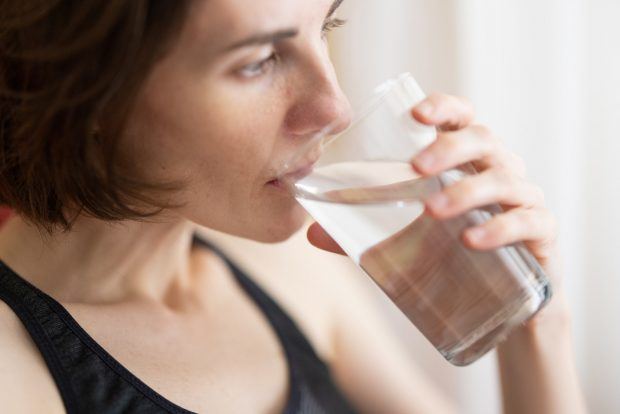Too much of a good thing can be a bad thing. We’ve heard this saying regarding fruits, supplements, and foods. Now, research is indicating that it also applies to water consumption. Consuming too much water as a means to avoid dehydration, or promote weight loss, can cause a condition known as over-hydration.
What is Over-hydration?
Over-hydration is an excess of water in our bodies. Also known as water poisoning, or water intoxication, this condition occurs from drinking too much water. Doing so increases the amount of water in our blood, which dilutes the electrolytes, especially sodium, in the blood.
Electrolytes are minerals in the blood and other body fluids that carry an electric charge. They are crucial to your body functioning effectively in many ways, from the amount of water in your body to the pH of your blood.
Sodium Imbalance
Sodium is the main electrolyte that is affected by overhydration. It helps to maintain the balance of fluids inside and outside of cells. But when the levels drop due to excessive water consumption, these fluids travel from the outside to the inside of these cells (which are also found in brain cells), causing them to swell. This is one of the dangerous effects of an electrolyte imbalance.
Symptoms of an electrolyte imbalance include:
- Irritability and Agitation
- Arrhythmia
- Nausea and vomiting
- Fatigue
- Muscle cramps, spasms, and weakness
- Itching
- Low or high blood pressure
When over-hydration occurs slowly and is moderate, brain cells have time to adapt, which causes mild symptoms such as distractibility and lethargy. When it occurs quickly, vomiting and imbalance issues develop. If it worsens, confusion or even seizures may develop.
Signs That You’re Drinking Too Much Water
- Color of your urine: While dark-colored urine is a telling sign of dehydration, we shouldn’t be aiming to produce clear urine. Pale-yellow urine is indicative of a healthy level of hydration. And colorless urine is indicative of needing to reduce your water intake.
- Frequent Urinating: According to Medical News Today, you should urinate 6 – 8 times daily. If you’re a regular caffeine drinker, the figure rises to 10. Anything more than this is a sign that you need to reduce your water intake.
- Constantly feeling fatigued: According to studies, drinking too much water can lead to a loss of energy and a constant feeling of fatigue due to electrolyte imbalance.
- Drinking water when you’re not thirsty: Experts believe that we can meet our daily water needs by letting our thirst tell us when to drink water. While some activities such as exercise and being outside in hot weather can warrant increased water consumption, we should allow our natural thirst to guide us in most situations.
We Still Need Enough Though
This doesn’t mean we should significantly lower our water intake. Making up about 30% of our bones, over 60% of our skin, over 70% of our lungs, and nearly 80% of our muscles, water is extremely important for our overall health and well-being.

The Importance of Water For Our Health
1. Regulating body temperature
Staying hydrated is vital to maintaining body temperature. Since water can absorb and transfer heat well, its consumption plays an essential role as a thermoregulator, regulating the body’s overall temperature by helping dissipate heat.
According to certified neurologist Joshua Thurman, M.D., “to keep the body temperature in its proper range, the body generates extra heat if it needs to, and dissipates extra heat in sweat.”.
To effectively do this, you need to consume a sufficient amount of water. The middle layer of the skin, also known as the dermis, stores most of the body’s water. When heat activates sweat glands, these glands transport the water, and the body’s salt, to the surface of the skin as sweat.
2. Brain Functioning
Your brain is 75% water, and sufficient consumption of water helps promote its healthy functioning. In fact, according to the Journal of The American College of Nutrition, even a small amount of dehydration – as little as 1% of your body weight – can affect your cognitive function.
Joshua Gavin, a neuroscientist at the University of Texas, states that “brain cells require a delicate balance between water and various elements to operate.”
Drinking water can improve one’s brain health by increasing blood flow and oxygen to the brain, which, in turn, improves cognitive performance. Water also helps balance your hormone levels by promoting neurotransmitters and hormone production, while also lowering your cortisol levels.
3. Digestive and cell function
Experts have confirmed that consuming water before, during, and after a meal aids your body in breaking the food down, making it easier for various nutrients and minerals to be absorbed into the bloodstream and delivered to your cells. Being dehydrated can slow the digestive process down, leading to health issues such as constipation.
4. Kidney Health
Adequate intake is important in keeping the kidneys functioning effectively, helping them remove waste products and excess nutrients from your body through urine.
Water also helps keep your blood vessels open so that blood can travel freely to your kidneys, and deliver essential nutrients to them. However, the kidneys are only able to remove 0.8 – 1 liter of water per hour. With this in mind, how much water should we be having to reap these benefits?
How Much Water Should We Be Drinking?
According to Harvard Medical School, most people need about four to six cups of water a day, depending on various factors we will go over in this article. With the popular recommendation being 8 cups a day, there has been confusion in terms of how much water we should be drinking, especially if we want to ensure adequate hydration, but not be over-hydrated.
Over the years, studies have produced varying recommendations on daily water consumption.
The U.S. National Academies of Sciences, Engineering, and Medicine determined that adequate daily water intake is:
- 3.7 liters for men
- 2.7 liters for women
No single formula fits everyone, as an individual’s water needs depend on various factors, including where you live, your diet, and how active you are.
- Where you live: You will need more water in hot, or dry areas, and if you live at a high altitude
- Your diet: If you consume a lot of coffee and caffeinated beverages, you are bound to lose more water through the extra urination, which you would have to supplement by drinking more water. Also, if you’re not consuming a lot of hydrating foods that are high in water (such as fresh fruits and vegetables), but have a diet that is high in salty, spicy, or sugary foods, you will require more water.
- How active you are: Physical activity, whether it be working out at the gym, walking, or being on your feet for extended periods, will cause your body to lose water at a faster rate, so you will need to drink more of it.
- Your health: If you are losing fluids due to vomiting or diarrhea, or have a health condition such as diabetes, you will need to drink more water.
If there’s one thing we know, it’s everything should be in moderation for optimal health
Water is vital, but as we’ve established, it can also be dangerous. This is the case with so many things that we consume. While our bodies need certain minerals, nutrients, and foods to function effectively. They can only cope with a certain amount, and anything exceeding that can result in unpleasant side effects.
Ranging from nausea, and headaches, to fatigue, we need to ensure we’re taking the recommended amount for our individual bodies and dietary needs because there’s no one-size-fits-all solution for our health.
MAIN IMAGE CREDIT: Photo by Fernanda Latronico
References
-
Liu, Y.N., Chen, H.B. and Liu, X.W., 2019. Rapid assessment of water toxicity by plasmonic nanomechanical sensing. Analytical chemistry, 92(1), pp.1309-1315.
-
Alfarouk, K.O., Ahmed, S.B., Ahmed, A., Elliott, R.L., Ibrahim, M.E., Ali, H.S., Wales, C.C., Nourwali, I., Aljarbou, A.N., Bashir, A.H. and Alhoufie, S.T., 2020. The interplay of dysregulated pH and electrolyte imbalance in cancer. Cancers, 12(4), p.898.



![women [longevity live]](https://longevitylive.com/wp-content/uploads/2020/01/photo-of-women-walking-down-the-street-1116984-100x100.jpg)










